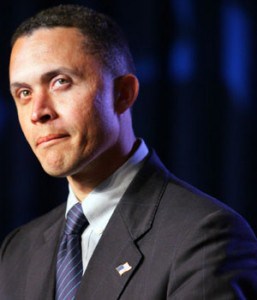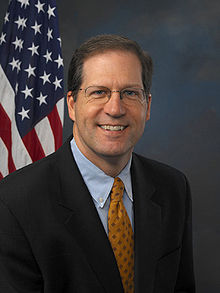
Ford, Jr.: Making his former public service pay-off with dollar-a-holler advocacy on behalf of Big Telecom.
Former U.S. Senator John Sununu and former U.S. Congressman Harold Ford, Jr., share several things in common:
- Voters tossed them out of their elected offices (or refused to elect them to higher ones) for poorly representing their interests;
- Both are honorary co-chairs of Broadband for America, the country’s largest Big Telecom-industry-funded astroturf effort;
- They don’t understand the concept of content provider traffic-hosting, and the traffic expenses they already pay.
Both jointly penned a letter in the San Jose Mercury News accusing Netflix of enjoying undeserved streaming profits, “subsidized” by large cable and phone companies that deliver broadband Internet service to paying customers:
Netflix’s current pricing model allows unlimited downloads for $7.99 per month. Netflix saves, with every download, approximately 40 cents that would otherwise be paid to the U.S. Postal Service. If the average customer downloads 10 movies and TV shows a month, Netflix will save $4 a month for each of its 23 million customers.
Obviously these massive transmissions over the Internet are not really free. Someone is paying for them. That “someone” is the millions of broadband subscribers, whether or not they are Netflix customers.
How is that fair?
Netflix argues that the marginal cost to the network providers of streaming a half-hour TV show to a residential customer is “one penny.” This ignores the hundreds of billions of dollars in sunken network investments needed to create that one-penny marginal cost efficiency at the customer’s end.
[…] It hardly seems fair to make users of these services pay more in order to subsidize Netflix’s costs of delivering their videos online.
This call for a fairer pricing model and a more realistic long-term investment strategy has bipartisan support. In 2010, the FCC said government policy should not discourage “broadband providers from asking subscribers who use the network less to pay less, and subscribers who use the network more to pay more.”
Neither former elected official comes to the debate with any direct experience as a telecommunications specialist, but since when does that matter. They know how to deliver talking points-on-demand.
Netflix, like every content producer on the Internet, pays hosting and content delivery fees to place their content online. Netflix hires a content delivery network to regionally distribute its video streaming to ensure the best, and most efficient route to ensure an uninterrupted viewing experience. While Netflix’s incremental costs may seem low, they still amount to millions of dollars annually in transport costs. And the online video streamer already pays extra additional fees to some of the largest broadband providers in the country, including Comcast.
The other factor Ford and Sununu ignore is the bill at the other end — the inflated cost for broadband service consumers already pay. For $40+ per month, consumers pay for service precisely to obtain the content of their choosing, and millions choose Netflix. That monthly broadband fee, far in excess of the actual cost to provide the service, more than compensates providers for the “network investments” that are now declining at a rapid rate, even as broadband bills keep rising.
No doubt part of your broadband bill goes to pay for industry astroturf operations like Broadband for America, which doesn’t represent a single consumer, even though you are paying for it. Of course, the marginal cost to hire industry lobbyists and their former legislative friends who today represent their interests (not yours), is pretty low on a per subscriber basis. It hardly seems fair to us that subscribers should be footing the bill for groups like Broadband for America, who regularly advocate against consumers’ best interests.
If providers are looking for more money to improve their networks, perhaps they can start by cutting off Broadband for America, an industry mouthpiece that cannot even get its core arguments anywhere near actual facts.


 Subscribe
Subscribe






